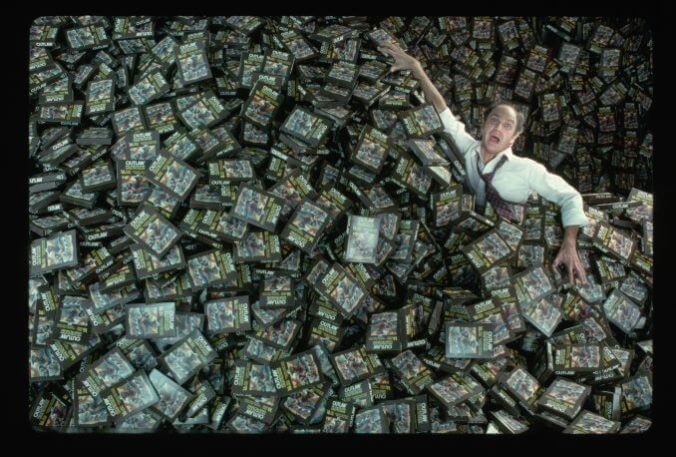The Videogame Crash of 1983 Helped Turn Games into a Boys’ Club. Could It Happen Again?
Photo of man buried under games by by © Roger Ressmeyer/CORBIS/VCG via Getty Images. Landfill photo by taylorhatmaker, under CC BY 2.0 Deed.
The nature of an economy is to rise and fall—to experience peaks and recessions, sometimes to devastating effect, sometimes limited to a certain sect of an economy. We all have or will experience a recession in our lifetimes, from the Great Depression, to the 2008 recession, to even the most recent COVID-19 recession. Then there’s the Great North American Videogame Crash of 1983.
In the early 1980s, arcade games experienced a massive boom with approximately 24,000 arcades in the United States alone. Games also thrived at home, with then-sophisticated consoles and games growing a massive audience. As the industry continued to grow more popular and profitable, companies began to flood the market with inferior product, both trend-chasers hoping to capitalize on this new, and industry leaders like Atari, whose poor home version of Pac-Man and tie-in with E.T. were both notorious bombs. After all, who wants to play a bad game? In 1983, Atari announced an $180 million loss in their third quarter, ending up with an overall $500 million loss that year. The home gaming market effectively felt dead.
Enter: Nintendo, the Japanese videogame company that would save North American gaming. Nintendo began to conduct aggressive research about gaming demographics, and it came back that boys were playing videogames in droves. Boys were playing more than girls so much that Nintendo’s ads aimed their product primarily towards boys. As those boys became teenagers and men in the ‘90s, the games industry continued to market almost exclusively towards them, making girls feel excluded. After initially appealing to boys and girls in the early ‘80s, videogames were redefined as masculine; they were sexy, they were how you got the girl, they were an escape—they made you a real man. The videogame was, effectively, reinvented and revived for the culture at large.
But all of that was 30 years ago or more. What does that have to do with 2023? At a glance the videogame industry is booming. Games like The Legend of Zelda: Tears of the Kingdom, Marvel’s Spider-Man 2, and Diablo IV, and even movies and TV shows like The Last of Us and Five Nights at Freddy’s, have been released to huge success over the past year. Everything is fine! This has nothing to do with the past. Right?
Take a closer look and you’ll find that there’s already been an estimated 9,000 jobs lost in videogames this year alone. Naughty Dog, CD Projekt Red, Team17, and Epic Games have all laid off significant staff since this summer. Volition shut down, Embracer Group is looking to sell Gearbox Entertainment, and Ubisoft was reported to be closing several of its European offices. E3 is dead.. Games have been delayed while others, like CrossfireX and Sega’s Hyenas, have been cancelled altogether. So what’s going on? Well it’s certainly not like the ‘80s—people are still buying games en masse, and it certainly isn’t due to an influx of faulty consoles or bad games. Sure, Cyberpunk 2077 may not have done too well at first, but that’s nothing in comparison to the dumpster fire of Quaker Oats’ 1982 Sneak‘n Peak videogame.
-

-

-

-

-

-

-

-

-

-

-

-

-

-

-

-

-

-

-

-

-

-

-

-

-

-

-

-

-

-

-

-

-

-

-

-

-

-

-

-









































